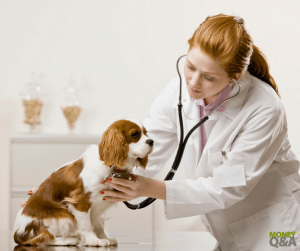
On average, you can expect to spend a couple hundred dollars per year on a dog (cats are relatively similar, too), but it’s important to set aside an emergency fund for unexpected veterinary expenses.
Pet Preventative Care to Save Money on Vet Bills
To lower your pet’s risk of falling ill or getting injured, there are a few preventative measures you can take to lower your veterinary bills:
Brush Your Dog’s Teeth
The average cost of a dog dental cleaning is approximately $300, which includes anesthesia because many dogs won’t stay still long enough to complete the procedure if they’re awake. Dental cleanings may cost significantly more if your dog develops dental diseases and requires additional blood work prior to the cleaning, as well as possible surgeries such as tooth extractions (which will require pain medications).
Although it seems silly, brushing your dog’s teeth (or regularly giving it dental-friendly bones or “doggie mouthwash”) can extend the timeframe in which you need to take them in to get professionally cleaned. Regular dental care at home is not a substitute for deep dental cleanings at some point, but it’s still a great way to keep their teeth healthy and eliminate doggy breath.
If you own a cat, don’t assume that dental care is only important for dog owners. Dental care is an important pet preventive care you need. You can also save money on dental cleaning for your cat by giving them tartar control treats, brushing their teeth, and taking them in for annual check-ups to ensure their teeth remain healthy for years to come.
Keep the Ears Clean
Some dog breeds – such as Cocker Spaniels and Labrador Retrievers – are more prone to ear infections than others. This is because their floppy ears accumulate moisture more easily than dogs with pricked ears, and with less airflow going into their ear canals, that moisture might turn into a bacterial ear infection.
Cleaning your dog’s ears on a weekly or biweekly basis can reduce the risk of ear infections – especially if they’re avid swimmers or it’s humid where you live – and lower your veterinary bills when it comes to unexpected infections and antibiotics needed to cure the infection.
Some dogs hate having their ears cleaned, and it can certainly be an awkward procedure whether you use wipes or cleaning solution and absorbent gauze to reach into their ears and make sure all the gunk is cleaned out. If you need help cleaning your dog’s ears, ask your vet to demonstrate how to do it the next time you see them so you can start doing it on your own at home.
What’s in Their Kibble?
There is a lot of debate over what constitutes the best diet for cats and dogs, but a few things stand out: 1) Mixing canned food and kibble is ideal because the canned food is generally less processed and higher in protein/meat content than kibble, but hard food is still good to include (if your pet’s teeth can handle it) because it keeps tartar at bay.
When it comes to choosing pet food, be sure to read the ingredients and determine your pet’s most vital needs – Weight loss? Healthy skin and coat? Senior nutrition? – rather than simply buying the food you have a coupon for because the right food goes a long way in preventing medical problems like obesity, lackluster fur, and digestive issues.
If your dog or cat suffers from digestive problems, consider adding probiotics to their diet to help them more easily absorb nutrients and lower their risk for diseases later on. While high-quality food and dietary supplements may cost you more money upfront, they can save you quite a bit of money on veterinary visits in the long run.
Deworming
A lot of pet owners aren’t aware of the fact that their pets should be dewormed about twice per year just to prevent dangerous parasites like heartworms from invading their pets’ bodies. Whereas heartworm prevention medications cost about $80 for a few months’ supplies, treating heartworm could cost over $1,000.
The same goes for flea and tick prevention – a small upfront cost for pet preventative care can save you a lot of money and headache (not to mention spare your pet from skin irritation and pain) over the course of their life.
Beware Online Pharmacies
Online pet pharmacies often offer significantly lower prices on their medications than what your vet office might be charging you. However, the FDA points out that buying medications, supplements, and other medically necessary items for your pets from an online pharmacy might be riskier than it’s worth. In some cases, you might get inferior products that do little to resolve or prevent health issues, which could extend the length of your pet’s disease or injury until you end up buying the proper, higher-priced medications from a certified veterinarian instead.
Pet preventative care is occasionally seen as unnecessary by pet owners who would rather save money on things like heartworm prevention treatments or supplements than dole out money “just in case.” Pet preventative care can still go a long way when it comes to improving your pet’s quality of life and saving money on veterinary bills over the course of many years.
What about you? Which pet preventive care measures did I leave out?


Great post. Our dog is our life. You provided a great list. He is only 12 pounds, but will not let us brush his teeth. We take him to the vet for that. You listed solid suggestions to keep you pet healthy and to do in in a prudent way.